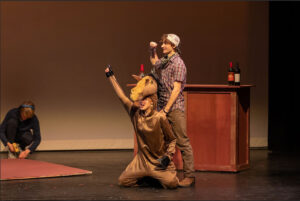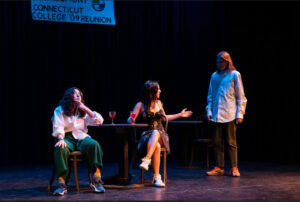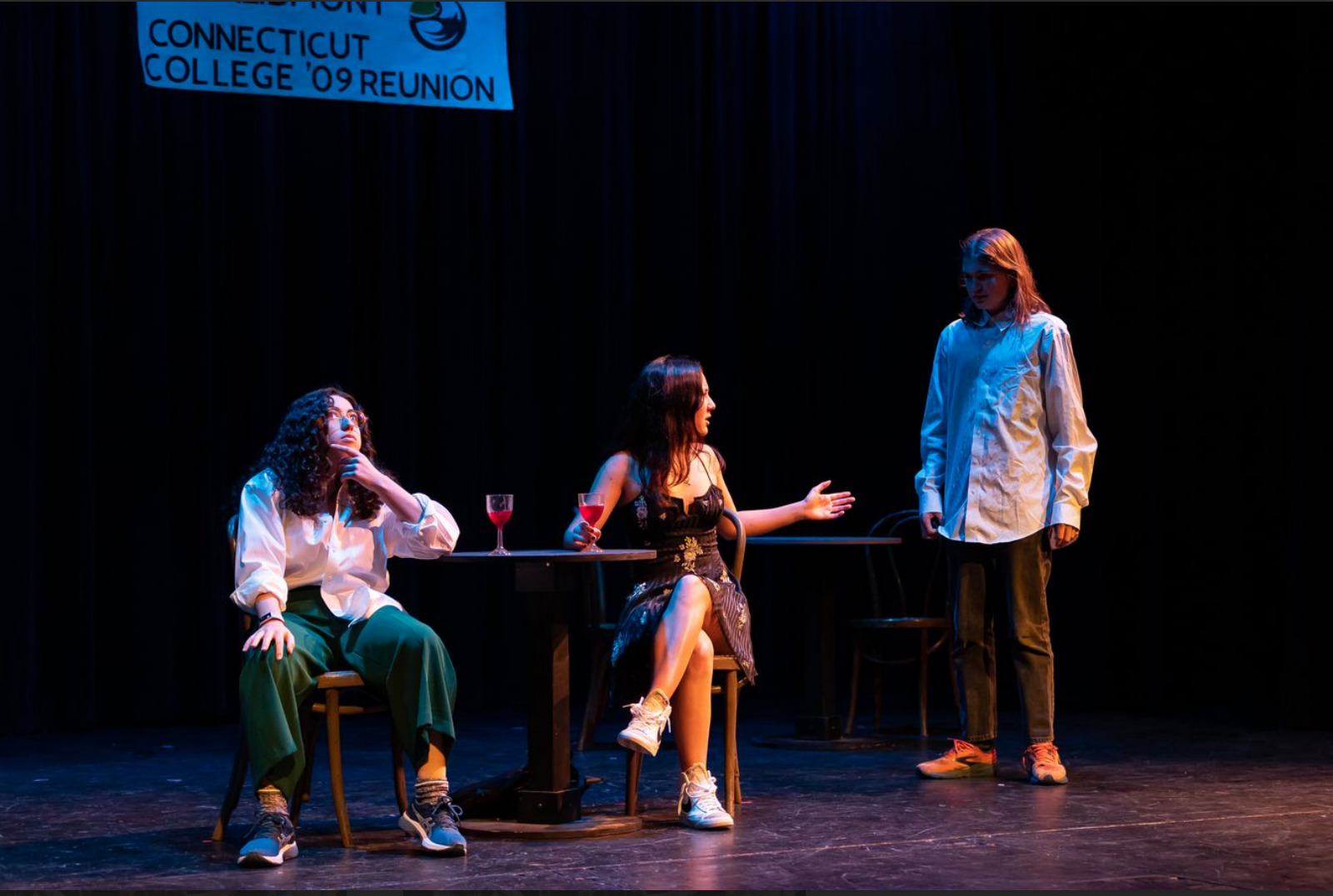On February 3 and 4, the Lick-Wilmerding High School One Acts returned with a splash. The student-produced pieces were creative, entertaining and covered a wide range of topics.
The Annual One Acts Festival is a mixture of full sized plays and interludes—shorter pieces that require fewer props and sets. All plays are written, directed, stage-managed and acted by students. This year’s pieces fell into two main categories: comedies and somber pieces, which prompted the audience to think about life and putting oneself out there. The comedies included A Cowboy’s Conviction (Western Gone Wrong) and A Bar Gets Walked In On. The somber plays were Nothing Scarier Than Mediocrity and Closure.
This year’s opening piece, A Cowboy’s Conviction (Western Gone Wrong), was a hit for the audience and other crew members. “Western is absolutely hilarious. I love it so much,” actor Percy Vermut ’24 said. The premise of the act is a middle school or high school play that goes terribly wrong: props fall apart, the audience gets in the way, and so on. In a Q&A with writers and directors after the show, writer Christophe Bihan ’23 explained that the inspiration for the piece came from The Play That Goes Wrong. That play was created by Henry Lewis, Jonathan Sayer and Henry Shields in 2012 for a theater in England.

photo courtesy of Vidigami
Directors Carter Jenkins ’23, Charlotte Wyman ’23 and Z Davis-Krukowski ’23 began the process of producing the One Acts back in October 2022 when they first put out an announcement requesting students to submit scripts. Inspiration for scripts came from anywhere; the interlude A School of Catfish was written to include a photograph of Daniel Tesfai while the idea for A Bar Gets Walked in On, another interlude, was brainstormed during class. Writer Jasper Champa ‘23 said he and a friend started bouncing bad bar jokes off of each other, which led to his writing of A Bar Gets Walked In On.
Once scripts were selected, the directors then began to work with the writers to understand their vision and refine scripts. “We usually try to get that done within the first few weeks of just constant back and forth between us and the writer,” Jenkins said. After the scripts were chosen, the audition process began. Actors did not need to prepare for their auditions. They were normally asked to read off a script or improvise. The directors sent out callbacks based on character-specific qualities.
The One Acts are known for attracting many more students to participate than typical LWHS theater productions. One reason this is true is the relatively low commitment rehearsal schedules and time spent rehearsing. “The students that audition like to be part of being known in the community and not have a huge commitment on their plates,” Theater teacher Miguel Zavala said. He explained that although rehearsals can be after school, they mostly take place during lunch and tutorial. Zavala thinks that another reason the show is popular with students is because it’s student-led. “[Students] like to work with students and not always with adults. That’s the reality of high school,” he said. Zavala added that although the production is student-led, it is managed and monitored by himself and other adults.
To become a director, one must take Zavala’s directing class. This class is offered every other year. If a student receives a B grade or higher in the class, they qualify to direct. Directing teaches students how to create emotional arcs, how to get the audience to feel things and overall how to create a piece.
In past productions, juniors would usually direct interludes while seniors would mostly direct full-length pieces. This year, because there were so few directors, they each directed multiple pieces and had the opportunity to choose which pieces they directed. Jenkins described how this process worked for him: “I thought they were funny. I knew the writers personally so I knew I could work with them and just get some good stuff out of it.” He directed three pieces: A Bar Gets Walked In On, Nothing Scarier Than Mediocrity and Mascot (Interlude). Nothing Scarier Than Mediocrity started as an interlude, but Jenkins and the other directors saw potential in it so they worked with writer Zachary Fuchs ’25 to turn it into a full length piece.

photo courtesy of Vidigami
The order of the show is decided based on a few factors. The first is whether the piece takes a while to set up. If this is the case, the One-Act will be at the beginning, after a long interlude or after intermission. The second factor is whether an actor is in multiple One Acts — if so they will need to be spread out. The directors also try to space out pieces of a similar tone or topics.
For the entire 35 years of the festival’s existence at LWHS, the One Acts have been student-led. Rob Mitchell ’90 started the production as a senior at LWHS. “I produced the first One Act Festival. I also directed one and acted in a different one. It was fully student-run from the beginning; we all pitched in to build the sets. It was in my senior year: 89/90 — the first year of the Ehrer Theater,” he said. There was no theater program at the time, so Mitchell went to the LWHS administration and asked to create one. This led to the creation of the LWHS theater program as it exists today.
Those involved in the One Acts believe that they have countless benefits from being student-led. “Inclusion of voices of the community is really important. Not only the director’s vision, but the writers, those that submit all these plays and interludes, having their voices heard is very important to the life of Lick-Wilmerding. Representing a student body that values the creative minds of anyone who wants to be involved,” Zavala said.
Zavala added that the process teaches students to be problem solvers and become more confident in themselves. Stage Manager Sarah Wolfe ’24 said, “When it’s completely student-led, you need to figure it out yourself. I think that factor teaches people a lot more than it would if you had someone constantly supervising you.”
Stagecraft teacher Kate Boyd explained that students get a sense of ownership and independence from being in charge. “[There is] a lot of freedom for creativity because it’s written and directed by students and I think it’s just a really fun experience,” Vermut said.
The main drawbacks of having less adult leadership are communication-related difficulties. “Sometimes things just don’t happen. People’s lives are busy, stuff falls through the cracks,” Jenkins said.
Zavala had a different outlook. “If I can see and assess that you are ready to do this, take on this responsibility and be accountable, then there are no drawbacks,” he said.
For the first time this year’s One Acts included a Production Assistant: Alexa DiSabato ’23. “I couldn’t fully commit to directing, so I just asked Mr. Z if there were any other ways I could be involved, and he suggested this,” she said. As the Production Assistant, DiSabato wrote announcements and made the program, among other organizational things.
“She was very instrumental in the organizational process of production in that way,” Zavala said. He added that he would be interested in keeping the Production Assistant role in the future.
There are many ways to become involved in the LWHS One Acts. Students can audition for acting parts, write scripts, take Boyd’s stagecraft class (which designs and builds all the props and sets), stage direct, volunteer to make costumes or direct. The directing class will be offered next fall. When students participate to create the show, they make sure that a beloved LWHS festival sticks around.







